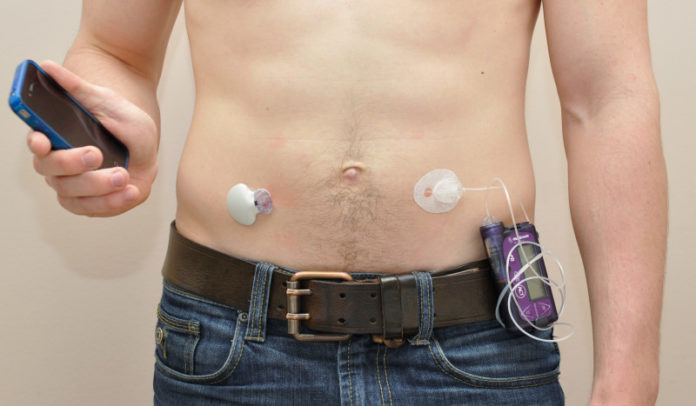
The world’s first clinical trial comparing three alternative treatments for type 1 diabetes was conducted in Montréal by researchers at the IRCM and the University of Montreal, led by endocrinologist Dr. Rémi Rabasa-Lhoret. The study confirms that the external artificial pancreas improves glucose control and reduces the risk of hypoglycemia compared to conventional diabetes treatment. The results, published in the scientific journal The Lancet Diabetes & Endocrinology, could have a significant impact on the treatment of type 1 diabetes, a chronic disease that can cause vision loss and cardiovascular diseases.
An emerging technology to treat type 1 diabetes, the external artificial pancreas is an automated system that simulates the normal pancreas by continuously adapting insulin delivery based on changes in glucose levels. Two configurations exist: the single-hormone artificial pancreas that delivers insulin alone and the dual-hormone artificial pancreas that delivers both insulin and glucagon. While insulin lowers blood glucose levels, glucagon has the opposite effect and raises glucose levels.
“Our clinical trial was the first to compare these two configurations of the artificial pancreas with the conventional diabetes treatment using an insulin pump,” says Dr. Rabasa-Lhoret, Director of the Obesity, Metabolism and Diabetes research clinic at the IRCM and professor at the University of Montreal’s Department of Nutrition. “We wanted to determine the usefulness of glucagon in the artificial pancreas, especially to prevent hypoglycemia, which remains the major barrier to reaching glycemic targets.”
People living with type 1 diabetes must carefully manage their blood glucose levels to ensure they remain within a target range in order to prevent serious long-term complications related to high glucose levels (such as blindness or kidney failure) and reduce the risk of hypoglycemia (dangerously low blood glucose that can lead to confusion, disorientation and, if severe, loss of consciousness, coma and seizure).
“Our study confirms that both artificial pancreas systems improve glucose control and reduce the risk of hypoglycemia compared to conventional pump therapy,” explains engineer Ahmad Haidar, first author of the study and postdoctoral fellow in Dr. Rabasa-Lhoret’s research unit at the IRCM. “In addition, we found that the dual-hormone artificial pancreas provides additional reduction in hypoglycemia compared to the single-hormone system.”
“Given that low blood glucose remains very frequent during the night, the fear of severe nocturnal hypoglycemia is a major source or stress and anxiety, especially for parents with young diabetic children,” adds Dr. Laurent Legault, paediatric endocrinologist at the Montreal Children’s Hospital, and co-author of the study. “The artificial pancreas has the potential to substantially improve the management of diabetes and the quality of life for patients and their families.”
IRCM researchers are pursuing clinical trials on the artificial pancreas to test the system for longer periods and with larger patient cohorts. The technology should be available commercially within the next five to seven years, with early generations focusing on overnight glucose control.
According to the Canadian Diabetes Association, an estimated 285 million people worldwide are affected by diabetes, approximately 10 per cent of which have type 1 diabetes. With a further 7 million people developing diabetes each year, this number is expected to hit 438 million by 2030, making it a global epidemic. Today, more than nine million Canadians — or one if four — are living with diabetes or prediabetes.
Story Source:
The above story is based on materials provided by Universite de Montreal. Note: Materials may be edited for content and length.
Journal Reference:
- Ahmad Haidar, Laurent Legault, Virginie Messier, Tina Maria Mitre, Catherine Leroux, Rémi Rabasa-Lhoret. Comparison of dual-hormone artificial pancreas, single-hormone artificial pancreas, and conventional insulin pump therapy for glycaemic control in patients with type 1 diabetes: an open-label randomised controlled crossover trial. The Lancet Diabetes & Endocrinology, 2014; DOI: 10.1016/S2213-8587(14)70226-8
